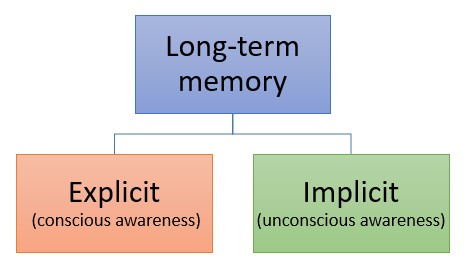Memory construction can be broken up into three stages: sensory, short term, long term. Sensory memory is the immediate recording of information that disappears quickly. Some sensory information will be kept in short term memory, which holds a few items for a short time. Lastly, some of the short term memory can be transferred into long term memory which is relatively permanent. The process of turning sensory and short term memory into long term memory is one that can be effected by many outside factors. For example, maintenance rehearsal is the process of repeating information to keep in working memory, increasing the chance of it going into long term memory. Visual imagery is another powerful aid to effortful processing. This is because visuals allow a person to create mental pictures. When a long term memory is achieved, it’s either procedural (implicit) or declarative (explicit). I will be focusing on the explicit memories, which include semantic and episodic. Semantic is general facts with no timeline, while episodic involves things that happen to you with a timeframe.

I recall a vivid reoccurring nightmare I would have as a kid in which I would fall into an endless dark pit after falling over the railing of the upstairs level in my house. This would always wake me up in a panic and sometimes off my bed. I would have this nightmare probably 2-3 times a week, which activates maintenance rehearsal. This is one of the reasons why I feel I can remember the vivid details of this nightmare. Another reason I can remember it so well is the fact that I have a mental image of the nightmare in my head. As this memory has been established as long term, it’s an explicit episodic memory. It’s explicit because I have to think about it to remember it and episodic because I have to travel back in time to recreate this memory. While I feel like I remember each and every detail of this nightmare, I know I’m a victim of the misinformation effect. This effect is caused by filling in missing pieces of information to make our recall more coherent.
There was another instance when I was just two years old where I experienced trauma and have a vivid memory of the situation. I remember I was standing on the edge of the open door of the non-moving mini van when I fell and hit my head on rocks, cracking my head open. I remember the action of falling down, followed by my cousin racing outside after he heard my screams. While I feel like I remember the exact situation, I know I’m experiencing infantile amnesia. Infantile amnesia occurs because until a baby turn around three and a half years old, they don’t have a conscious memory. However, I believe I have some recollection of the memory because it was trauma that caused it, therefore it has a special allocation in my brain.
Memory construction is a process that can be easily manipulated. Through techniques like maintenance rehearsal, or through acts of trauma, short term memory thoughts can be turned into long term which last relatively permanent.